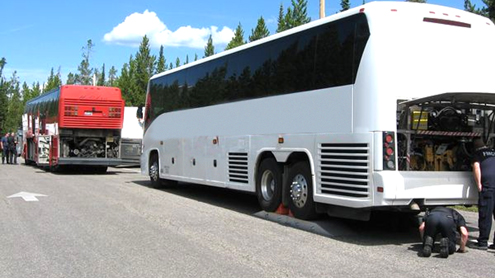

The systematic program ranks members every 90 days with regard to the FMCSA SAFER system database
Public outcry rippled through the industry last year following the two horrific coach crashes involving the Sky Express and World Wide Tours motorcoach companies, prompting a number of proactive responses for a safer industry. Suggestions ranged from driver awareness training to stricter safety monitoring.
The American Bus Association (ABA) board of directors and staff moved to initiate a new and rather revolutionary program to supplant their anger for the bad name these rogue operations bring on the industry.
The association initiated a systematic program to review its membership ranks every 90 days with regard to the FMCSA’s SAFER system database and expel any company that has an “Unsatisfactory” score. ABA allows companies showing a “Conditional” score 180 days to bring the scores up to “Satisfactory” or face removal from the membership roster.
According to ABA Membership Director Roderick Lewis, in 2012 the association has identified and immediately removed from its ranks eight companies that had fallen to unsatisfactory status with FMCSA.
“We wanted to respond by doing something more concrete and lasting,” says ABA President and CEO, Peter J. Pantuso. “We wanted to let the public know that if anyone boards a motorcoach belonging to one of our ABA members they will have the assurance in knowing they are working with a well-run, compliant company with safe, well-maintained coaches and properly trained drivers.”
Pantuso says ABA decided to take this step to clearly demonstrate how seriously it regards all safety issues and to help ABA members run the safest operations possible.
Lewis says ABA also found 25 companies operating in conditional status and has informed them of the 180-day period to bring their scores up to the satisfactory level.
“We tell companies in this situation how they can improve their score,” he says. “ABA can and will assist in whatever way we can, namely by working with well-established companies in the Bus Industry Safety Council (BISC) and using other resources we can recommend.”
Dan Ronan, ABA’s senior director of communications, says none of the eight companies removed from the roster have returned to ABA.
“We take this responsibility very seriously,” says Ronan. “The fact ABA has cited 33 member companies and culled out eight proves this is a course of action we will pursue.”
He says the ousted operators are but a small fraction of the roughly approximate 1,000 motorcoach companies operating in the U.S. and Canada, and represent about 3 percent of the ABA membership that has faced safety-related issues.
The association established its code of ethics to help promote and maintain the highest standards of intercity bus service and personal conduct among its members. Prior to becoming an ABA member company the motorcoach operator must first agree to and sign the ethics code, promising compliance with all state and federal regulations.
Drivers take an oath to conduct operations in a safe manner in order to protect the public and to promote the image of the industry. They promise to instill consumer and public confidence in the industry, avoiding any action conducive to discrediting it or membership in the association.
The association based this action on its belief that federal and state governments must have the authority to impound motorcoaches after the authorities shut down such unsavory companies. ABA also supports ongoing legislative efforts to improve motorcoach safety, such as the proposal to assign motorcoach companies a letter grade of A through F, dependent on a company’s inspection scores.
According to ABA, no other association takes this step to remove unsafe members from its membership or has a clear-cut code of ethics about business operations. BR
